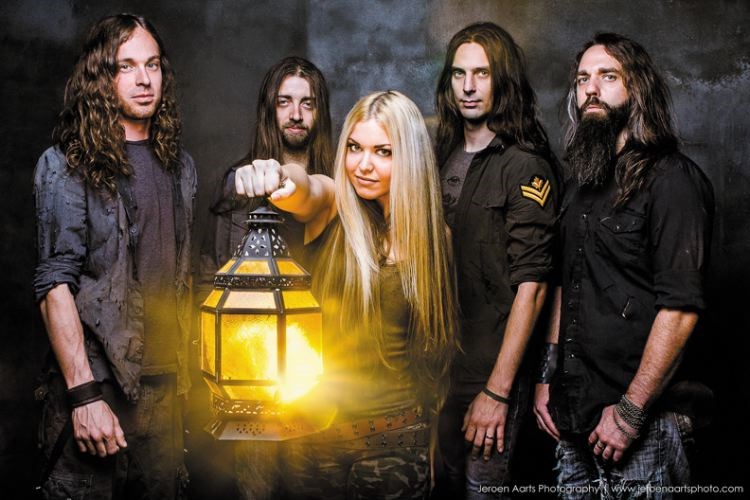Aggression-metal has a similarity to genres like opera or powwow singing. To the untrained ear, it can sound merely like high-intensity wailing, raging nonsense.
Study it a little, though, and soon the patterns and deliberation start to emerge. Study it a lot and one starts to detect the levels of artistry from song to song and the skills from vocalist to vocalist.
One of the most popular case studies in the world is Vicky Psarakis, lead vocalist for Canadian crushers The Agonist. The Montreal quintet is one of Canada's preeminent metal bands of any description, and among metal bands fronted by women The Agonist is a global all-star.
Psarakis is possessed of a unique ability, a coveted dual skill in the metal community.
She is a practitioner of the clean-and-growl or clean-and-scream vocal ability. As the name implies, it means she can deliver a prototypical singing style but then shift gears to a guttural rumble that seems to originate in the lower spine before exploding through razor blades in the throat. It is sometimes described as the voice of an angel and the voice of a demon within one body.
With The Agonist set to perform in Prince George on Thursday, Psarakis gave The Citizen a quick clinic on how she summons the heights and depths of her powerful voice.
"Up until I was 20 or 22 it was just singing what came easy to me or felt comfortable and what I naturally sounded good doing, but after a certain point in my life I was listening to these (growl-enabled) vocalists that I admired and I would get that thought of how the f--- is this person doing this?" she said. "I would try out stuff. That's how I discovered and unlocked different parts of my voice. It's not just singing and screaming. There is variety within both of those ways of producing sound. I wouldn't say it's based on my talent, it's just based on hard work."
On this particular phone call from a pitstop in Quebec, the barbs in her speaking voice were clear to hear. Psarakis spoke in low tones and without enunciation stress in order to be gentle on her musical instrument.
She takes care of her singing voice the way an athlete looks after the sports body. Unlike a broken string on a guitar or a worn skin on a drum, if her throat gets damaged, there is no easy repair.
It even affects how she and the band construct songs and set-lists. Composing lyrics has to take into account the balance between the clear and the crunchy. Like a Formula One driver can't shift from eighth gear straight to second gear without possibly destroying the transmission, Psarakis can't double-clutch her voice either.
"I try to think of the live aspect as well (when writing songs), like will I be physically capable of doing this, live or will it be a real struggle?" she said.
"I do take it into consideration but I'm also really stubborn and kind of a perfectionist when it comes to writing music so I will sometimes do something that's really bad on my end, something that's vocally demanding, if I think it complements the music so much that I put the recording above the live version. I never want to sacrifice a good vocal idea just because it's difficult for me to do live."
The Agonist has taken some criticism for possibly softening their approach in recent times, but Psarakis said this is an incidental condition of being five musicians who are all interested in making compelling music. Anyone who listens to recent singles like Follow The Crossed Line or The Moment and you'll spot the same old Agonist aggression spraying out the gaskets, even if there might also be their dark cover of Take Me To Church and the all-singing ballad A Gentle Disease on the smoother side. It's just their attempt to keep things interesting, she explained.
The band has attracted contention as well for their lineup change in 2014. Original lead vocalist Alissa White-Gluz took on the fronting job of metal megaband Arch Enemy with the full blessing and partnership of that band's original leader Angela Gossow. White-Gulz had intended to maintain her position with The Agonist as well, but the four remaining members wanted someone focused on their project. They sought out Psarakis, finding her in Chicago where she still lives when not involved in The Agonist's face to face business.
Two albums later and another one due soon, Psarakis hasn't given up her Blackhawks jersey in favour of the Canadiens, but she has become a metallic ambassador across the Canada-U.S. border. She said she had not yet met White-Gulz face to face but was a fan prior to the surprising call she got from The Agonist. Psarakis has hopes that all involved can settle any sad emotions over the lineup movement, even if the fans' dream of an Arch Enemy/The Agonist double-bill doesn't ever come to pass.
To ease the transition for the American into the Canuck lineup, did The Agonist bandmates (Danny Marino and Pascal Paco Jobin on guitar, Chris Kells on bass, Simon McKay on drums) give her any ritualistic initiation, like force-feeding her poutine?
"They didn't have to force feed me. I do eat poutine because it's amazing and I actually do miss it when I'm in the States," Psarakis said.
She is looking forward to the western leg of the band's tour so she can see even more of enormous Canada. This is her first visit to Prince George and has already heard that it's a city primed for metal.
The Agonist headlines at The Legion with Kelowna's Drop Dead Fred and Williams Lake's Tombstone opening the event.
Tickets are $20, on sale now at Electron Sound & Percussion while supplies last. The local show is a presentation of the Metallion Festival.



